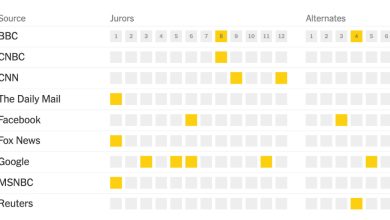Vessels await word that they can carry the first grain shipments out of Ukraine.

ODESA, Ukraine — The first shipments of grain since the beginning of the war in Ukraine have been loaded onto freighters at Ukrainian ports on the Black Sea, getting ready for their first voyages in more than five months.
President Volodymyr Zelensky and representatives of the Group of 7 industrialized nations visited Chernomorsk, one of the three ports, on Friday and have said they are ready for the grain to head to countries hit hard by food shortages.
The visit came less than a week after Russian cruise missiles struck at the nearby Port of Odesa, threatening to upend a deal brokered by the United Nations and Turkey to allow Ukraine to begin exporting grain. Ukrainian ports have been sealed by a Russian naval blockade of the Black Sea since troops invaded the country on Feb. 24.
In his nightly address on Friday, Mr. Zelensky repeated that Ukraine is ready.
“Concrete work on the restoration of Ukrainian grain exports began today in Odesa,” he said adding, though, that he wasn’t sure when the first shipment would go out. “I don’t want to make any forecast now; let’s see how the agreements on grain export will be implemented. The U.N., Turkey and other international partners are responsible for the security side of this process.”
His visit to the Black Sea coast followed a trip Friday to the Port of Odesa by ambassadors from the United States and Europe, who, together with Ukraine’s minister of infrastructure, pressed Russia to abide by the deal and said it was possible that the shipments could get underway soon.
“Millions of people around the world are waiting for grain to come out of this and other Ukrainian ports,” said Bridget A. Brink, the American ambassador to Ukraine, who was making her first visit to Odesa. “It’s very important for Russia to live up to its commitments and to allow this grain to be exported.”
As she spoke, one of the large cargo ships expected to deliver grain — called the Navi-Star — sat moored at the Port of Odesa near a cluster of large silver grain silos, its crew, in orange overalls, busy on deck. The Turkish-owned bulk carrier has been stuck in the port since Feb. 19, days before the invasion began, according to the maritime website MarineTraffic, as one of a handful of vessels that did not manage to get out before the blockade.
The mechanics of transporting grain through the Black Sea with little trust between warring sides are extremely complex. The operation has several moving parts, and the parties — Ukraine, Russia, Turkey and the United Nations — were still working out important elements on Friday, a U.N. official said.
A joint coordination center that opened in Turkey on Wednesday is working to establish standard operating procedures, including monitoring and inspection and emergency response, said Ismini Palla, a U.N. official, adding that the teams were also still working out the safe routes and corridors for the inbound and outbound ships.
“Once all of those elements are in place, then we will start seeing the first movements,” Ms. Palla said. “The ultimate goal is to ensure the safe passage of commercial vessels.”
Ukraine is a leading exporter of wheat, barley, corn and sunflower, but its shipments plummeted after the war began, undermining a global food distribution network that was already strained by poor harvests, drought, pandemic-related disruptions and climate change. Exports from Russia, also a major supplier, fell as well.
The United Nations has warned of potential famine and political unrest, and Western officials have accused President Vladimir V. Putin of Russia of using hunger as leverage for sanctions relief.



